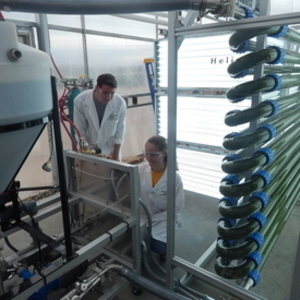US DOE injects $18 million into algae technology development

Photo: John McGowen
July 10, 2015
BY U.S. DOE
The U.S. DOE announced July 9 that six projects will receive up to $18 million in funding to reduce the modeled price of algae-based biofuels to less than $5 per gasoline gallon equivalent (gge) by 2019. This funding supports the development of a bioeconomy that can help create green jobs, spur innovation, improve the environment, and achieve national energy security.
Algal biomass can be converted to advanced biofuels that offer promising alternatives to petroleum-based diesel and jet fuels. Additionally, algae can be used to make a range of other valuable bioproducts, such as industrial chemicals, biobased polymers and proteins. However, barriers related to algae cultivation, harvesting, and conversion to fuels and products need to be overcome to achieve the DOE’s target of $3 per gge for advanced algal biofuels by 2030. To accomplish this goal, DOE is investing in applied research and development technologies that can achieve higher yields of targeted bioproducts and biofuels from algae—increasing the overall value for algae biomass.
The projects selected include:
Advertisement
-Producing Algae and Co-Products for Energy, Colorado School of Mines, Golden, Colorado—Colorado School of Mines, in collaboration with Los Alamos National Laboratory, Reliance Industries Ltd., and others, will receive up to $9 million to enhance overall algal biofuels sustainability by maximizing carbon dioxide, nutrient, and water recovery and recycling, as well as biopower cogeneration.
-Marine Algae Industrialization Consortium, Duke University, Durham, North Carolina—Duke University will receive up to $5.2 million to lead a consortium including University of Hawaii, Cornell University, Cellana and others to produce protein-based human and poultry nutritional products along with hydrotreated algal oil extract.
-Global Algae Innovations Inc., El Cajon, California—Global Algae Innovations will receive up to $1 million to increase algal biomass yield by deploying an innovative system to absorb carbon dioxide from the flue gas of a nearby power plant.
Advertisement
-Arizona State University, Mesa, Arizona—Arizona State University will receive up to $1 million for atmospheric carbon dioxide capture, enrichment, and delivery to increase biomass productivity.
-University of California, San Diego, San Diego, California—The University of California, San Diego will receive up to $760,000 to develop an automated early detection system that can identify and characterize infestation or infection of an algae production pond in order to ensure crop health.
-Lawrence Livermore National Laboratory, Livermore, California—Lawrence Livermore National Laboratory will receive up to $1 million to protect algal crops by developing “probiotic” bacteria to combat pond infestation and increase ecosystem functioning and resilience.
The DOE's Office of Energy Efficiency and Renewable Energy accelerates development and facilitates deployment of energy efficiency and renewable energy technologies and market-based solutions that strengthen U.S. energy security, environmental quality, and economic vitality.
Related Stories
U.S. fuel ethanol capacity fell slightly in April, while biodiesel and renewable diesel capacity held steady, according to data released by the U.S. EIA on June 30. Feedstock consumption was down when compared to the previous month.
The U.S. EPA on July 8 hosted virtual public hearing to gather input on the agency’s recently released proposed rule to set 2026 and 2027 RFS RVOs. Members of the biofuel industry were among those to offer testimony during the event.
The USDA’s Risk Management Agency is implementing multiple changes to the Camelina pilot insurance program for the 2026 and succeeding crop years. The changes will expand coverage options and provide greater flexibility for producers.
The USDA’s National Agricultural Statistics Service on June 30 released its annual Acreage report, estimating that 83.4 million acres of soybeans have been planted in the U.S. this year, down 4% when compared to 2024.
SAF Magazine and the Commercial Aviation Alternative Fuels Initiative announced the preliminary agenda for the North American SAF Conference and Expo, being held Sept. 22-24 at the Minneapolis Convention Center in Minneapolis, Minnesota.
Upcoming Events










